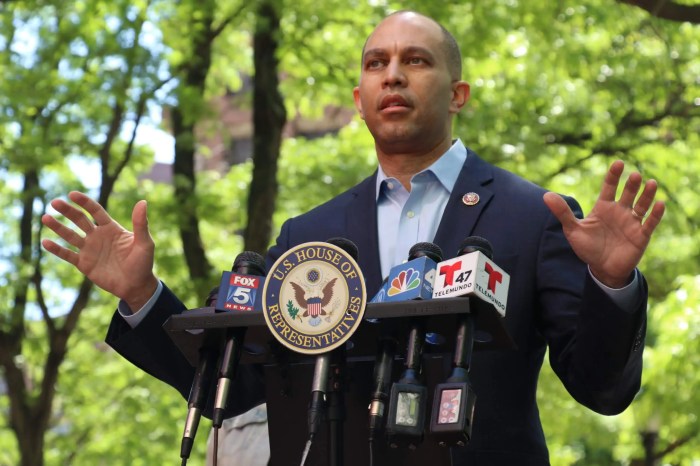If you’ve had a baby yourself, or are close to someone who has, you know that many new and expecting mothers and birthing people spend a lot of time preparing to make sure their newborn has everything they need. There are so many new items you need for a baby: a crib, stroller, clothing, diapers, and the list goes on.
A crucial part of the mission of the NYC Administration for Children’s Services (ACS), which is dedicated to keeping children safe and families supported, is training our staff to ensure new moms and birthing people can be connected to what they need to safely care for their baby. We’re taking an upstream approach to child welfare by providing these warm referrals outside of the traditional child welfare system. We can provide families with critical items and specific concrete resources like diapers, sleep sacks, and child care referrals, but we also need to support their mental health (both child and adult) by connecting them to the appropriate experts.
There are other, less tangible needs during and after pregnancy that many people are afraid to talk about due to social stigma. According to the National Institute of Health, maternal mental health disorders are the number one complication associated with pregnancy and the process of childbirth. PMADs, or perinatal mood and anxiety disorders, are a group of illnesses that affect approximately one in five women during pregnancy and the postpartum period. And, according to the Maternal Mental Health Leadership Alliance, Black women are twice as likely as white women to experience a PMAD, but half as likely to receive treatment. PMADs include: perinatal depression, perinatal anxiety, perinatal obsessive compulsive disorder, perinatal post-traumatic stress disorder, and postpartum psychosis. It is understood that the perinatal period begins three months prior to childbirth and may continue to at least one year post birth.
While pregnancy and childbirth can be a blissful, exciting time – and societal standards continuously reinforce this belief – pregnancy and parenthood can be extremely challenging for many people. Sometimes this is due to past or current trauma. Those suffering from a PMAD describe it as debilitating; sometimes exacerbated by the feelings of shame, embarrassment, by the social stigma, and fear felt by so many who keep these feelings to themselves. Left untreated, PMADs can lead to very concerning outcomes when paired with other exacerbating factors, including the inability to care for oneself and one’s child, self-injurious behavior, and in rare cases, infanticide and suicide. But PMADs are treatable under the right care.
As we celebrate Women’s History Month and the vital role women play in our lives, it is of the utmost importance that we do everything we can to ensure women have the supports they need to lead healthy, happy lives. That’s why at ACS we’re raising awareness about PMADs, signs and symptoms, its prevalence, and the ways in which these conditions can be treated. We’re educating our staff members so that they can not only understand PMADs, but also navigate families to the help they need from mental health professionals and other experts.
This work is just one strategy among many offered by the City of New York to improve maternal mental health, including those in Women Forward NYC and Healthy NYC. The more we raise awareness for and educate people about PMADs, the more likely they are to come forward and ask for help, and the more likely friends and family are to recognize when a loved one is struggling. We can mitigate the shame and stigma and demonstrate to all parents that they are not alone and it’s okay to ask for help.
ACS is now partnering with leaders in the field of Maternal Mental Health (MMH) and PMADs to provide child welfare professionals at ACS and its contracted provider agencies with new trainings on maternal mental health, helping to ease access to community-based supports for individuals with this treatable set of conditions. More specifically, the new targeted trainings will focus on the basics of maternal mental health and various aspects of PMADs, including how to raise maternal mental health awareness among all families (regardless of socio-economic status), how to recognize the signs and symptoms of PMADs, and how to offer appropriate PMAD resources for referrals. As part of this work, there will be a thorough review of the agency’s policies and practices that intersect with the population most impacted by PMADs and proposed recommendations.
To keep children healthy and safe, our city needs to ensure new and expectant parents have easier access to the full spectrum, mental and physical, of supports they need. ACS will continue to enhance its work in supporting mothers and birthing people experiencing maternal mental health disorders, so that more parents know they’re not alone, and that with the right support they can find hope, joy, and feel so much better.
Moms and families who feel they need mental health support can call the National Maternal Mental Health Hotline which provides 24/7, free, confidential support before, during, and after pregnancy at 1-833-TLC-MAMA (1-833-852-6262) or the National Suicide Prevention Lifeline at 988.
Winette Saunders is first deputy commissioner of the of the NYC Administration for Children’s Services and Dr. Jacqueline Martin is senior advisor of the NYC Administration for Children’s Services.























